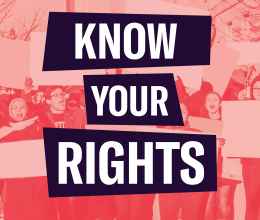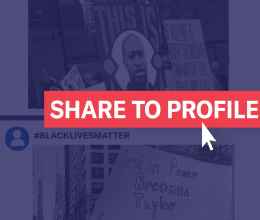CHICAGO - A controversial use of Illinois' eavesdropping law – prosecuting civilians for audio recording police officers conducting their public duties in a public place – cannot be enforced against the ACLU and its employees for the foreseeable future. This order, issued by U.S. District Court Judge Sharon Johnson Coleman, remains in place until the district judge makes a final ruling in this case. The judge’s preliminary injunction was ordered by a federal appellate court ruling in May that held such prosecutions likely violated the First Amendment rights of the public to record the work of public officials, including on-duty police officers.
In the last eight years, at least fourteen people have been prosecuted under this law for audio recording on-duty police, and each has faced the threat of imprisonment for up to 15 years. Three of these controversial prosecutions were brought by the Cook County State’s Attorney.
"We are pleased that the district court has acted swiftly to put this injunction in place," said Harvey Grossman, legal director of the ACLU of Illinois. "It is another step in ending the unconstitutional practice of prosecuting individuals for openly audio recording police officers conducting their public duty."
The injunction follows a July 2nd hearing on the ACLU’s motion to enter the preliminary injunction and for a final ruling and permanent injunction. The State's Attorney's office asked the court to stop all further proceedings in the matter while they seek a review of the May appellate court decision by the Supreme Court of the United States, and told the judge that they would not prosecute anyone for openly recording police officers while the preliminary injunction was in place. The State’s Attorney also sought to delay any decision on the ACLU’s request for a final ruling in the case, saying they would seek to present testimony from law enforcement experts suggesting that audio recording police officers presents a threat to public safety. That notion is generally rejected by the federal appeals court and runs counter to the views of Chicago Police Superintendent Garry McCarthy (who runs the largest law enforcement agency in Cook County) who stated publicly that he does not oppose permitting civilians to audio record police officers. Such recordings take place in cities all across the country as the Illinois statute is the most restrictive law of this type in the nation.
The ACLU opposes this further delay on the ground that it seeks to prolong needlessly the case.
The injunction and possible Supreme Court appeal are the latest developments in a case filed by the ACLU in 2010, in which the ACLU of Illinois asked the federal court to bar the State's Attorney from prosecuting ACLU staff from recording police officers performing their public duties in a public place. The recordings would take place as part of the ACLU's long time practice of monitoring police practices on the streets of Chicago -- most recently seen during the NATO Summit in the City.
"We welcome the representations of the State's Attorney that they will not prosecute anyone -- not simply those working on the ACLU's observer project -- while the injunction is in place," added Richard O’Brien of Sidney Austin LLP who is cooperating on the case with the ACLU of Illinois.
"At the same time, we are mystified that the State's Attorney continues to fight this litigation,” added the ACLU’s Grossman. “Both the courts and the tide of public opinion clearly has turned against enforcing the eavesdropping statute in this way. Editorial boards across the State are against it. Two state courts are against it. And, two federal appellate courts have ruled that prosecuting people in this way violates the First Amendment."
Two state courts already have found the use of the state eavesdropping statute to prosecute individuals for recording police performing their public responsibilities in public places to be unconstitutional under Illinois' constitution. Illinois Attorney General Lisa Madigan recently dismissed an Illinois Supreme Court appeal she had taken from one of the cases. An effort to change the law stalled in the Illinois General Assembly this past spring.
The ACLU of Illinois is assisted in this matter by the Chicago office of Sidley Austin, including Richard O'Brien, Linda Friedlieb, Robert Leighton and Matthew Taskin.



